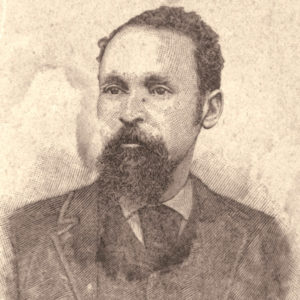calsfoundation@cals.org
Benjamin Frank Adair (1852–1902)
Benjamin Frank Adair, born a slave in Phillips County, established a legal practice in central Arkansas in the late 1800s and was elected to the Arkansas General Assembly. There, he supported the Separate Coach Law of 1891 (a Jim Crow law requiring separate coaches on railway trains for white and black passengers)—the only black legislator to do so. His reputation was later damaged when he engaged in embezzlement and fraud.
Benjamin F. Adair was born a slave in 1852 in the Silver Creek Township of Phillips County. His mother, Charlotte, a Virginia-born slave, was owned by Benjamin F. Adair Sr., a white planter and the father of Adair. After the passage of Act 151 of 1859, a law demanding that all free blacks leave the state, Adair’s father left Arkansas with Charlotte and their children and settled in Oberlin, Ohio, where he made a living farming and manufacturing cotton gins.
On January 25, 1860, Benjamin Adair freed twelve of his slaves, including Charlotte and their children. In the 1860 census, Charlotte and her children appeared as free blacks residing within the household of Benjamin Adair Sr., having added their father’s surname. In the 1860 census, Benjamin Adair appears as Coot Adair, possibly a term of affection for the then eight-year-old, but by the 1870 census, Adair appeared as Frank Adair. This shortened form may have been used to distinguish the young Adair from his father. The following year, he enrolled in Oberlin College in Ohio. Adair attended the college from 1871 to 1874, though there is no record of him receiving a degree.
After leaving Oberlin, Adair moved back to Arkansas. On September 1, 1879, in Lee County, he married Docia Wright. By the following year, the couple was living in the town of Cotton Plant (Woodruff County) with a seven-month-old son, Frank B. Adair III. By 1884, he moved his family and legal practice to the town of Argenta—now North Little Rock (Pulaski County)—where he fought unsuccessfully against efforts by Little Rock (Pulaski County) to annex Argenta. He also actively recruited and campaigned for the Democratic Party.
In Argenta, Adair gained a reputation as “one of the state’s most eloquent orators” and was considered among the best black criminal attorneys in the state. In 1890, Adair was elected to the state legislature as the representative for Argenta, by then an incorporated part of the city of Little Rock. As a member of the Arkansas House of Representatives, he served on the committees for Circuit and Justice Courts, Cities and Towns, and the Practice of Medicine, but he was best known for being the only black legislator to support a bill that called for the reinstitution of segregated streetcars and railcars throughout the state, though his reason for this support has not been documented.
Adair’s tenure as a legislator was short lived. On January 28, 1891, he received an indefinite leave of absence from the legislature due to illness and, after recuperating, returned to practicing law in Argenta. The Pine Bluff Daily Graphic maintained that Adair’s reputation as a “negro shyster” and his involvement in “shady transactions” forced him to leave Pulaski County and resettle in Sherrill (Jefferson County). Adair’s reputation declined precipitously after his move to Sherrill in 1894. The following year, Adair was arrested for embezzling ten dollars from the Phoenix Lumber Company, and, being unable to pay the $150 bond, he was committed to jail. Adair was subsequently able to avoid prosecution on the embezzlement charges but within months found himself embroiled in another controversy after cheating a client by receiving funds to file for her divorce and failing to do so.
Despite the noticeable decline in the quality of his legal services, Adair continued to practice law in Sherrill until his death. On May 28, 1902, Adair was found dead at his home from heart failure. In reporting his death, the Arkansas Democrat noted, “Adair was in politics a Democrat and in former years held an important state and federal offices. In later years he squandered all his money and at the time of his death was eking out a miserable existence in the practice of law at Sherrill. He was respected by both white and colored people.”
For additional information:
“A Ticket.” Arkansas Democrat, July 26, 1890, p. 8.
“B. F. Adair Dead.” Arkansas Democrat, April 1, 1902, p. 4.
“For Embezzling: A Prominent Negro Lawyer and Politician in Trouble.” Pine Bluff Daily Graphic, August 22, 1895, p. 1.
“He Should Be Punished.” Pine Bluff Daily Graphic, October 16, 1895, p. 4.
“Legislative Notes.” Arkansas Daily Gazette, January 29, 1891, p. 6.
“Local Brevities.” Arkansas Democrat, August 29, 1884, p. 1.
“Local Brevities.” Arkansas Democrat, January 29, 1887, p. 4.
“Pine Bluff News. Arkansas Gazette, March 30, 1902, p. 2.
“Roster of the General Assembly.” Arkansas Gazette, December 4, 1890, p. 3.
Brian K. Mitchell
University of Arkansas Little Rock
 Law
Law Politics and Government
Politics and Government Post-Reconstruction through the Gilded Age, 1875 through 1900
Post-Reconstruction through the Gilded Age, 1875 through 1900 B. F. Adair
B. F. Adair 




Comments
No comments on this entry yet.